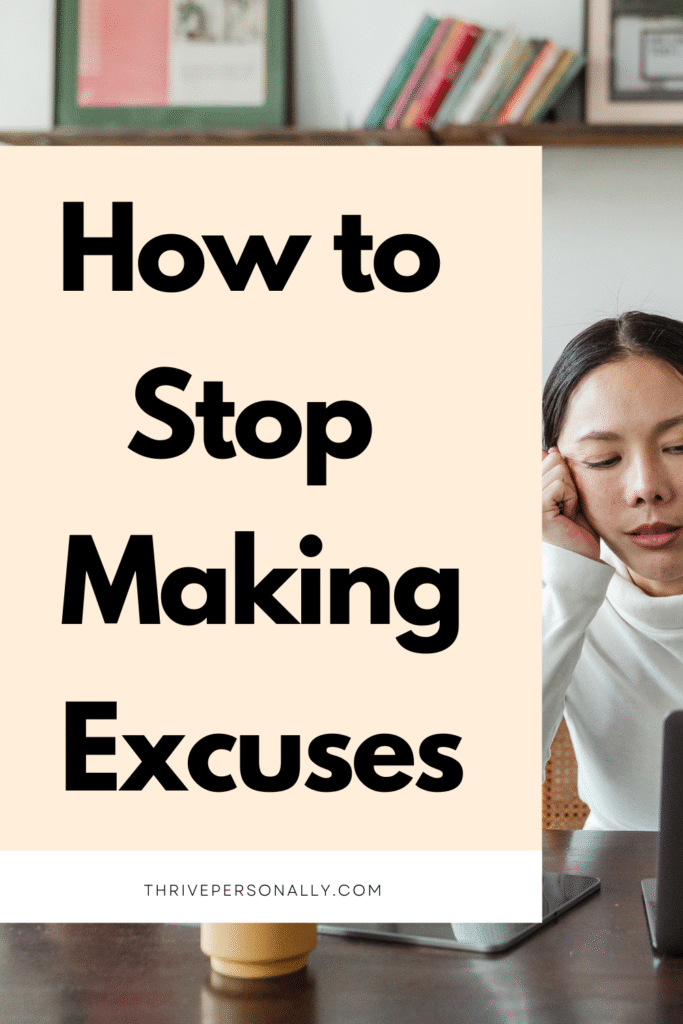Each of us makes excuses at some point. You convince yourself that it’s not the right time. You say you’re too tired or too busy. You promise to do it tomorrow. Maybe you blame your past, your surroundings, or someone else. You come up with reasons for why you can’t do what you know you should be doing.
Excuses feel safe. They protect you from fear, discomfort, or failure. But what begins as protection becomes a barrier between you and the life you want. Excuses chain your mind. They stop your progress.
You don’t have to be perfect to stop making excuses. You don’t need to be tough. What you need is honesty. You have to face yourself without judgment and choose a better way.
Why Do People Make Excuses?
Excuses aren’t always lies. They’re often stories you tell yourself to feel safe. Many times, they come from fear, doubt, or past failure. Maybe you’re afraid to fail. Maybe you’re tired or feeling too low to begin.
Excuses start small. But over time, they become a habit. Your brain learns to avoid effort. Excuses feel like a safe way out, but they only give short-term comfort. In the long run, they lead to regret.
They sound like:
-
I’m not ready.
-
I don’t have time.
-
I’m not good at this.
-
It’s not my fault.
-
I’ll do it later.
They might feel true, but they hold you back. They keep your future tied to your past.
Read also: 8 Simple Tips to Beat Procrastination and Get Things Done
How Excuses Hurt Your Life
When you keep making excuses, your mind starts to believe them. You feel less confident. Your goals feel farther away. You begin to believe you can’t change. The longer you wait to act, the harder it gets.
Excuses don’t just stop progress. They shape how you see yourself. You lose faith. You get frustrated. You might even start to dislike yourself.
Excuses harm your personal life, your work, and your future. If you’re always looking for a reason not to try, you’ll always find one. And soon, doing nothing becomes normal.
This cycle doesn’t have to continue. It only takes one decision—to stop lying to yourself, to speak the truth, even when it’s hard.
Read also: 7 Life Lessons Every Woman Should Learn Early
11 Stops to Make in Breaking the Excuse Habit
1. Notice When You’re Making an Excuse
It starts with awareness. Pay attention to your words. When you say, “I can’t,” ask yourself: Is that true? Or just uncomfortable? What are you avoiding?
List your common excuses. Look for patterns. What are they really protecting you from?
2. Own Your Choices
You can’t control everything. But you can choose your actions, responses, and focus. Owning your choices gives you power.
Blaming others takes your power away. Owning your role gives it back. You realize you can change your life—one decision at a time.
3. Focus on What You Can Do
When you’re stuck, your brain wants a way out. Excuses sneak in. Shift your focus.
Instead of what’s hard, ask: What small thing can I do today? Action beats excuses every time.
4. Set Realistic Goals
Sometimes your goals are too vague or too big. That brings excuses.
Break big goals into simple steps. Instead of “get fit,” say “walk 20 minutes after dinner three times this week.” Clear steps are easier to start.
5. Check Your Self-Talk
Excuses often come from fear-based thinking: I can’t. I’m not smart enough. I’ve never done this before.
Speak to yourself with care. Say:
-
I’m learning.
-
I get another try.
-
I don’t have to be perfect.
Kind self-talk makes it easier to begin.
6. Forgive Your Past Mistakes
Sometimes you make excuses because you failed before. Maybe you’re afraid to try again.
But your past doesn’t define your future. Everyone fails. What matters is what you do next. Learn from it. Let it go. You have permission to grow again.
7. Be Around Honest People
Excuses grow in silence. It’s easy to believe them when no one challenges you.
Tell someone what you want to do. Ask them to check in with you. Honest support keeps excuses in check and gives you motivation.
8. Track Your Progress
Seeing progress builds confidence. It reminds you that change is possible.
Use a notebook, checklist, or calendar. Celebrate small wins. They silence the voice of doubt.
9. Accept That Growth is Uncomfortable
You’ll never feel 100% ready. Growth is hard. That doesn’t mean you’re failing. It means you’re changing.
Instead of running from discomfort, face it. Say: “This is hard, and I’m doing it anyway.”
10. Let Excuses Show You Something
Every excuse has a reason behind it. Listen. What fear or belief is hiding underneath?
Ask: Is this true? Is it helpful? What else could I believe instead?
11. Build Systems, Not Just Goals
Goals are results. Systems are habits. Goals can feel far away. Systems help you stay consistent.
James Clear, author of Atomic Habits, says systems create lasting change. Goals guide you. Systems keep you moving.
The Science Behind It
Research shows excuses are linked to low self-control and fear of failure. When you’re scared to fail, your brain tries to help by avoiding the task.
A study by the American Psychological Association found that small, consistent steps work better than waiting for motivation.
Another study from the National Library of Medicine shows that your mindset and self-talk directly affect your ability to keep going or give up. Talking honestly with yourself improves your follow-through and your mental well-being.
Discipline doesn’t come overnight. But with practice, your brain learns to act. You don’t have to let excuses win.
Final Thoughts
Excuses are not your enemy. They’re signals. They show you what you’re afraid of, what you doubt, or where you’re tired. But you don’t have to obey them.
You don’t need perfect conditions or constant motivation. You only need a choice: that your future matters more than your fears.
Start today. Look at your patterns. Take one small step. Speak to yourself with truth.
You’ve only seen what your excuses let you see. Now is the time to see more. Start again. With honesty. With hope. Without delay.
Save the pin for later



